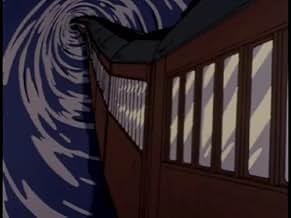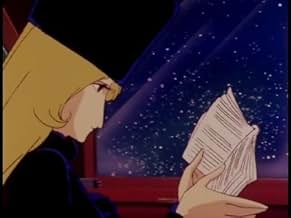Ajouter une intrigue dans votre langueThe adventure of a young boy on board a space train, as it travels to a myriad of incredible worlds.The adventure of a young boy on board a space train, as it travels to a myriad of incredible worlds.The adventure of a young boy on board a space train, as it travels to a myriad of incredible worlds.
Parcourir les épisodes
Histoire
Le saviez-vous
- AnecdotesLeiji Matsumoto was inspired by Kenji Miyazawa's novel "Night on the Galactic Railroad," about a steam train flying through space.
- GaffesThe number of cars on 999 sometimes varies. While this can be explained in different episodes by the idea that cars may be added in between episodes, the number of cars also vary within each episode, which isn't explainable.
- ConnexionsFeatured in Making Gundam: The Inside Story (2019)
- Bandes originalesGinga Tetsudô 999
Lyrics by Jun Hashimoto
Composed by Masaaki Hirao
Arranged by Nozomi Aoki
Performed by Isao Sasaki
Commentaire en vedette
Galaxy Express 999 will always hold a special place in my heart, on the benefit of quite possibly being the first anime I ever saw when I was a child. Back then, all I had was a handful of videotapes to choose from, which provided a nice window into this universe envisioned by Leiji Matsumoto.
Roll two decades later, I finally have an oppoturnity to watch the entire series, an oppoturnity I would surely not miss. Finally, I would be able to witness the entire journey of Tetsuro to acquiring his mechanical body, with the assistance of a mysterious woman named Maetel, an odyssey that would slowly teach him that maybe eternal life isn't all it's cracked out to be.
However, as time passed and I dove deeper into this universe, I began to discover how deeply flawed it was. While I was prepared for the series eschewing any kind of scientific accuracy and realism in favour of delivering a story, I wasn't quite expecting it to cheat. Let me elaborate; in the early episodes, an auxiliary character attempting to steal Tetsuro's ticket is a very common plot device. However, as the series progresses, we are introduced to an increasing amount of the railroad company's rules and regulations which eventually amount to such theft never having been really possible in the first place. What's worse, these rules are sometimes introduced and then promptly forgotten or altered. For example, a passenger may be let onboard in an emergency, however what exactly constitutes an "emergency" varies wildly and nonsensically; an abusive husband counts as such, while having your entire home planet about to explode doesn't. The most jarring example is an episode where Tetsuro and Maetel are kidnapped (this also happens frequently) and we are told of a regulation that entitles the railroad company to send an armored train to free them. Not only has this rule never been brought up on previous occasions, it is never brought up again in subsequent episodes! For those who do not understand the implications of this; this kind of blatant cheating in terms of storytelling spoils the drama completely as it comes across as a cheap method of introducing unpredictability into the series. What's worse, despite the series' relatively long run, there seems to be absolutely no character development in regards to Tetsuro, leading me to believe that there was very little communication or planning between the several writers; the lack of a story bible is obvious.
It's really difficult to give this show any kind of score. The numerous failings of this series don't really become obvious until about a third or a quarter into it's run, so I guess I could be generous.
Roll two decades later, I finally have an oppoturnity to watch the entire series, an oppoturnity I would surely not miss. Finally, I would be able to witness the entire journey of Tetsuro to acquiring his mechanical body, with the assistance of a mysterious woman named Maetel, an odyssey that would slowly teach him that maybe eternal life isn't all it's cracked out to be.
However, as time passed and I dove deeper into this universe, I began to discover how deeply flawed it was. While I was prepared for the series eschewing any kind of scientific accuracy and realism in favour of delivering a story, I wasn't quite expecting it to cheat. Let me elaborate; in the early episodes, an auxiliary character attempting to steal Tetsuro's ticket is a very common plot device. However, as the series progresses, we are introduced to an increasing amount of the railroad company's rules and regulations which eventually amount to such theft never having been really possible in the first place. What's worse, these rules are sometimes introduced and then promptly forgotten or altered. For example, a passenger may be let onboard in an emergency, however what exactly constitutes an "emergency" varies wildly and nonsensically; an abusive husband counts as such, while having your entire home planet about to explode doesn't. The most jarring example is an episode where Tetsuro and Maetel are kidnapped (this also happens frequently) and we are told of a regulation that entitles the railroad company to send an armored train to free them. Not only has this rule never been brought up on previous occasions, it is never brought up again in subsequent episodes! For those who do not understand the implications of this; this kind of blatant cheating in terms of storytelling spoils the drama completely as it comes across as a cheap method of introducing unpredictability into the series. What's worse, despite the series' relatively long run, there seems to be absolutely no character development in regards to Tetsuro, leading me to believe that there was very little communication or planning between the several writers; the lack of a story bible is obvious.
It's really difficult to give this show any kind of score. The numerous failings of this series don't really become obvious until about a third or a quarter into it's run, so I guess I could be generous.
- Takeshi666
- 2 mars 2012
- Lien permanent
Meilleurs choix
Connectez-vous pour évaluer et surveiller les recommandations personnalisées
Détails
Contribuer à cette page
Suggérer une modification ou ajouter du contenu manquant

Lacune principale
By what name was Ginga Tetsudo 999 (1978) officially released in Canada in English?
Répondre


























